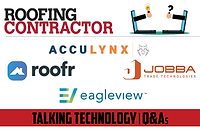Roofing Technology 2024 Q&A: Jobba Trade Technologies
Jobba Trade Technologies' Zach Carpenter joins the conversation on emerging technology in the roofing industry and what’s ahead.

New products and innovations designed to help roofing contractors grow their businesses are always hitting the market. Yet, if it seems like a tidal wave of new technology has flooded the roofing industry over the past five years or so, roofing veterans are quick to note it’s been more like an evolutionary process.
If true, Zach Carpenter has been around the industry for most of it. The senior account executive at Jobba Trade Technologies has more than 16 years in the industry, focused on roofing software. As a founding member of Jobba’s legacy product, FCS, he’s dedicated his career to helping roofing contractors improve their business processes through technology. He still has a passion for delivering new, customized solutions to the challenges roofing contractors face every day, and he shared some of that while reflecting on the state of technology in roofing today in this Q&A.
Editor’s Note: Responses have been lightly edited for clarity
How would you currently describe the state of technology in roofing?
ZC: The state of technology in the roofing industry is in an interesting position. The vast majority of the industry seems to have adopted and is using some form of technology, even if it’s just a simple tool. There are still a good amount of contractors who have no technology in place or are looking to find a solution. From my perspective, the roofing industry as a whole, is at a “mid-evolution” point.
Describe how technology is helping the industry now.
ZC: Technology is impacting the roofing industry in so many different ways, but the one that sticks out to me the most is that it is creating more opportunities. The introduction of technology creates opportunities and opens the doors to attract talented individuals to the roofing industry. With the use of drones for aerial imagery, advanced roofing materials, roofing apps, 3D modeling, and AR, along with robotics, it will eventually become easier to use technology than not use it to be successful. We are an industry in transition, for sure.
Is technology hurting the industry?
ZC: Technology is hurting the roofing industry [because] the industry is rapidly trying to “catch up.” There are and will continue to be a lot of “fly-by-night” apps and solutions popping up. To avoid this, work with a software vendor that has been in the industry for a respectable amount of time and plans to stay in the industry.
How does Jobba fit into that scenario? What new products or innovations are underway?
ZC: Jobba offers three different solutions to help contractors grow and accelerate their business. Between Jobba, BidPad, and FCS, Jobba provides a solution, regardless of where a contractor is in their business development. Our business management tools take into account where our contractors are currently and where they want to be in three, five, or 10 years.
How can you help contractors justify ROI on technology tools?
ZC: The ROI for a roofing contractor moving from pen and paper to a business management solution will be immense. Aside from the efficiency and consolidation, it allows contractors to provide a better customer experience and improve their overall business. Purchasing technology tools should also be looked at as an investment and it will improve business operations and productivity in the long run. Understanding the contractor's tech stack and seeing where we can eliminate redundancies so that the contractor is using the least amount of technology for a better overall impact on their business is critical.
Is technology impacting consolidation in the roofing industry?
ZC: Technology is certainly impacting the consolidation in the roofing industry from all of the recent private equity acquisitions down to the day-to-day operations. Technology advancements in any industry should improve how contractors do business with homeowners, building owners and suppliers, and how the suppliers do business with the contractors. The advancements should be all around.
Are there any gaps or problems within the industry you see that can be fixed with technology?
ZC: Many contractors take the first step into software and technology by getting a couple of independent tools or applications. This solution can initially be okay but should not be used as organizations scale because their data becomes scattered and all the information lives in multiple applications. Even if a contractor or business is just starting or new to technology/software, start at an entry-level package that can grow as needs arise.
What areas of tech are growing in the roofing space?
ZC: The area of tech within roofing I see growing is primarily SaaS, or software as a service. Another area of growth will surround the use of AI, or artificial intelligence, and aerial measurement technology. Additionally, I believe AR, or augmented reality, can have a strong application in the industry, too.
What makes you feel optimistic about using and adopting technology in roofing?
ZC: I'm optimistic about the point in time — which we may have already reached — when the option to not utilize technology will drastically limit your ability to compete in the marketplace. This applies to contractors and suppliers alike.
Will the roofing industry be recognizable in 10 years, given the growing tech landscape?
ZC: Recognizable? Yes. I believe the roofing industry will still look recognizable 10 years down the road, but hopefully, it will be very different. I can foresee AI estimating tools, AR roof training programs, and so much more.
Looking for a reprint of this article?
From high-res PDFs to custom plaques, order your copy today!







